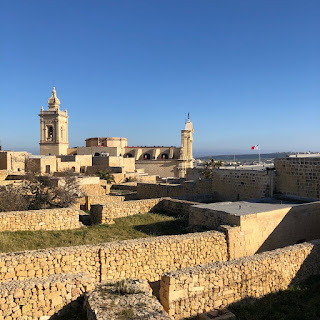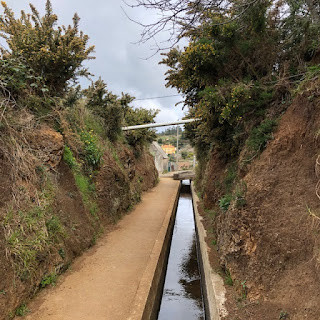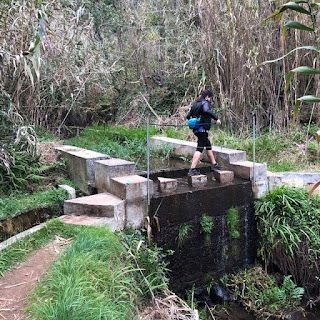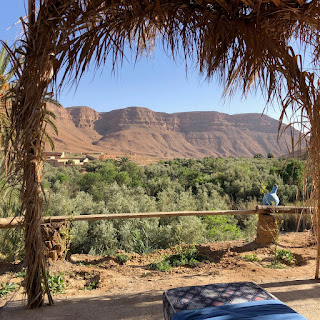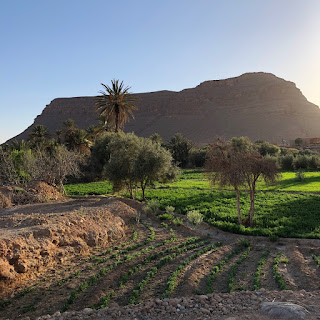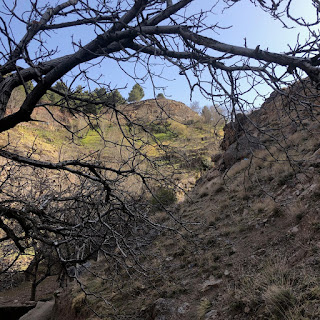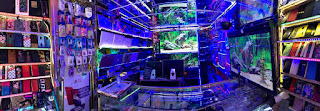Wednesday, May 8, 2019
Taxi Ride in Alexandria, Egypt
Monday, April 8, 2019
Thought on Malta
Although we posted some photos on Instagram and Facebook, didn't really say much about Malta. Check it the Facebook posts, if you have access.
After Egypt, it was a very easy place to visit. Given that it was under English control for so many years, things were rather efficient and in decent shape. A fellow partner who had spent a large chunk of his sabbatical on Malta had noted that he felt a certain 1st world veneer over a 3rd world base. Coming from Egypt, we didn't really get that sense.
What was so amazing about Malta is the depth of history. The Neolithic temples were extensive and of incredible creative, complex and unique. Clearly a financially stable and rich society dating a good 1000 years before the first pyramids. At some point it seemed to terminate and became repopulated again.
Malta's history of the Knights of Saint John, who came to Malta after withdrawing from Rhodes, is also a rich vein of history to explore. The main cathedral is quite amazing. It is not as huge as some we have seen, but the resources put into the facility is amazing. The Knights had groups from the Crusades from the various places in Europe and each group, such as those from Provence, were given an area of the cathedral to decorate. The Knights were basically pirates with respect to the Ottomans and other Muslim groups and amazed amazing wealth. One is always amazed with what can be created when a bunch of men with extreme wealth start competing with each other. Similar thing occurred with rich men during the Renaissance with gardens in Italy. Tivoli Garden was one of such gardens.
In addition, there is the history of World War II and the role that Malta played. It was bombed more heavily that any other place. Nice nautical museum, as well.
Food on Malta was hard to find. (Good food that is.). Seems a bit of the English influence. The Italian influence was from Sicily and Southern Italy, so there is lots of heavy tomato sauces in everything.
Our last dinner in Malta was at a wonderful restaurant. Too bad we didn't find it earlier. I had an amazing rabbit in the style of Malta. I was sucking the bones (learned from my Dad and sister). The waiter commented: "Finally a tourist that eats like a Maltan."
We ended up renting a car for two days in Malta to hit the sites outside of the main city. Was a great way to see the islands. Surprisingly small. Was a kick getting used to a stick shift while driving on the left side of the road (English influence).
Being in Malta during Carnival was a kick. Amazing how everyone was out night after night. Lots of parades, floats, kids dressed up. A real bonus.
Overall, a great rest and transition to Morocco.
Sunday, March 31, 2019
Monday, March 25, 2019
Levadas in Madeira
Sunday, March 17, 2019
Being Shocked in Milan
Traveling in Muslim countries, one gets used to certain conventions with respect to behavior.
When we left Egypt we flew to Milan for about 36 hours before heading to Malta.
We stopped upon arrival in Milan at the airport for coffee. While standing in line, an Italian man grabbed the breast of the woman he was with, as a joke I assume.
I should note that the couple were not your normal couple. Lots of gold, designer sportswear, fascinating cropping of hair, but still, I found it so totally disrespectful, unacceptable and rather repulsive.
Random photo for this blog to follow (cell phone cover):
Visiting a Palmeraie
After visiting the Sahara in Southern Morocco, we headed north toward Fes. On the way up, we stayed in the Ziz Valley.
The Ziz river basically flows south and disappears and reappears. When it reappears (water table is above ground) it is basically an oasis, and you find palmeraie (palm groves). The palmeraie is more than just a palm grove, it is also a whole way of life around this precious water and making the most of the fertile land associated with it.
We had driving by many palmeraie on the way down to the Sahara, but had not actually gone into one in a meaningful way.
The stop at the palmeraie in the Ziz Gorge allowed such a walk through a palmeraie without any tourists or invasion of the outside world.
The palms basically provide dates, wood and fiber material for roofs, etc. They also provide a higher canopy for shade for crops that grow under them. We saw both fava beans and alfalfa, both of which fix nitrogen. The alfalfa is used mainly for feed for animals. Lots of fruit trees, such as apricot and apple trees. Lots of other vegetables, as well.
The walk also included an area where many of the buildings were slowly melting back into the soil.
We stayed in a Berber guest house. We have been amazed at how comfortable all of the beds have been in Morocco. They seem to have that down.
Wonderful stop on the way to Fes.
Moslem Sites in Cairo
One thing that I didn't get to blog about while in Cairo was the beautiful mosques we saw in Cairo.
We had seen some mosques, including the Blue Mosque, in Istanbul, but they didn't really do much for me.
In Cairo, on our first complete day in Cairo, we started our day at the Mosque of Ibn Tulun. It dates back to 879 A.D. It has a certain elegance and simplicity to it, which is often the result of spending less and focusing more on quality. Beautiful place. It is on one end of medieval Cairo, so we proceeded to walk all the way through medieval Cairo. We were walking on basically a continuous market street, with us ending up in the main market area. In the walk you could see the changes in the wealth of the community. We started in a very poor area. We were clearly strangers. The community was active and people clearly were enjoying life.
The street had people, donkeys, bikes, three wheel scooters, motorcycles, cars, etc. Vehicles communicated by honking horns.
Amazing vibrancy.
Eventually, we were overlapping with areas in which tourists frequented, which substantially changed the nature of the products being sold and the interaction with the vendors. Rather than being left alone, we were hassled quite a bit. Still these areas were areas that were predominantly serving the local community with some minor sales to tourists.
We came back into the area the following day and continued our walk North all the way to our hotel. The market activity continued all the way to our hotel in a more middle class area. Amazing the amount of commerce occurring on the street.
We are now in the Medina in Fes, Morocco. It too is a vibrant market area. Clearly the people live here. What is being sold is mostly for the locals. The quality of goods seem to be much better in Fes, as well.
Saturday, March 16, 2019
New Music
1300 SW Fifth Ave., Suite 2400
Email: georgemardikes@dwt.com
Monday, March 11, 2019
Shower Floor and the Hammam
The floor of our shower at the Kasbah du Toubkal. The writing is in Berber, which you read left to right, unlike Arabic. Our hiking guide said their alphabet is more like Greek. The writing says "Slippery when wet" and "Don't leave water running while soaping." :)
Sunday, March 10, 2019
Goats
Favorite goat clip from today's hike. I sometimes get that way in a feeding frenzy.
Goats a big with the Berbers, but only meat and milk. Not for cheese. Not enough green vegetation for making good cheese. Northern Morocco produces the goat cheese.
Hiking Today
Hiking in the High Atlas Mountains. These four shots were from the same place. Just turned around to take each. Loved the irrigation system covering the communities.
This reminded me a lot of the family villages in Greece.
Saturday, March 9, 2019
Miscellaneous
Thanks to Bob Newell's suggestion to get a Bluetooth keyboard.
Nothing like having to find something to get some interaction with locals.
See attached panorama of one of the shops we were waiting in while someone ran around the area trying to locate a keyboard.
We are now in the Atlas Mountains in Morocco. We are here for three nights. Some rest and relaxation, as well as hiking in the mountains.
The place is quite amazing. https://kasbahtoubkal.com/m/en/
Health back to normal.
Marrakesh compared to Egypt in the words of Tara "is like Lake Oswego."
We are just amazed at how well Egyptians were able to seamlessly integrate pedestrians, bicycles, scooters, motorcycles, three wheel motorized carts, horse carriages, taxis, cars, white minivan busses, tour busses, etc. Incredible efficiency. Moroccans are not nearly as good. Not sure why. Maybe the density of Egypt just requires it.
Egypt - Aswan Area
These photos were taken around Aswan. We enjoyed the slower pace after Cairo. It is more of a Nubian community given the displacement due to the Aswan High Dam.
The people are more laid back and things are more relaxed.
We really enjoyed the Nubian bread and the whole wheat (and probably rye) pita bread. It is amazing how much pita bread is made continually throughout the day in every Egyptian settlement. We also had incredible felafel. They use favas instead of chickpeas. Makes them incredibly light.
While in Aswan we arranged to visit Abu Simbel. It is close to the border with the Sudan. To go, we left our Nubian guest house at about 4:00 am, met up with someone who took us across the ferry (we were on Elephantine Island), while picking up more people, then we waited at the Corniche (the main road that runs along the Nile in Aswan). Of the people waiting, we were all assigned to different minivans, which then went off and picks up people at other places in Aswan. Then the caravan headed off for the three hour drive.
Once we got there we had about an hour to view the site. This is the site with the four huge statues of Rameses II sitting next to each other. Basically, it was to let anyone coming down the Nile to beware the power and might of Rameses II. The old, I will smite you threat.
The best artists were not used here since size was what mattered. Nobody buried here. Not that great compared to other things we saw. Even so, the mass migration down and back was fun to watch. It was a drive in the desert, which we had not experienced. And we arrived before the large tour groups, so we got to see it early with decent light and no crowds.
Abu Simbel was the site that was moved when the High Aswan Dam was built. They did an amazing job of moving it and recreating the setting. They had articles in Life Magazine back when I was growing up showing it.
We did enjoy the Philea Temple outside of Aswan. It was another site that was moved do to the flooding. Another nice job of moving. This had some nice art, as well. I believe the Ptolmies and Romans were responsible for it.
Saturday, March 2, 2019
Thoughts on Egypt
We are now sitting in Milan. 24 hours ago we were sitting in a Kushari (https://en.m.wikipedia.org/wiki/Kushari)place in Cairo, having our last meal in Egypt. More on that below. Returning to Cairo for the last evening was a great experience. Compared to our arrival, were were quite functional, at ease and really enjoyed walking the streets with the local Cairenes.
The city is huge and intense. Once senses that the continued struggle with entropy is slowly being lost. But the struggle continues.
Absent the first 24 hours in Egypt, I don't think I have ever been in a country where I have felt safer. We walked hours everywhere, in incredibly poor areas, and in the dark of night, and we always felt the sense that we were safe. People in Egypt had noted that this was the case, and we tested it.
The people have a sense of humor and it was nice to engage it.
I regret not to have posted more, but there have been a couple factors limiting posts. First, there has been a lot to digest and one does not want to be too quick to judge or to make pronouncements. Understanding sometimes takes time. Second, all the walking in the polluted Cairo air burned my lungs causing a cold and I had a bout of intestinal issues. Such ill health zaps energy, so the blog was the first to suffer. The low energy can lead to negative thoughts, which are more a function of poor health. Finally, I miss having a keyboard. It is a pain to write with just one finger.
So back to the Kushari restaurant. We are sitting there eating and an elderly Italian couple are seated across from us. They were quite fashionable and we chatted a bit with them. Kushari has a mix of pasta, lentils and rice, garnished with chickpeas and fried onions. It is served with a tomato sauce, lemon juice, cumin, hot pepper and garlic vinegar. It is really amazing stuff. We had it three times, including our last night in Cairo. Quite healthy, as well.
So we are eating away chatting with the Italian lady. She is a bit aghast that she is having pasta in Egypt. She is quite certain the cannot do pasta. The man is rather professorial and is going with the flow.
It finally arrived and we help explain how to assemble it all. Tara notes the hot chili as a warning.
The man begins first eating and is really enjoying it. Then the women joins in and by the time we left them they were both really enjoying it.
We need to open a Kushari shop in Portland.
So the next day we are having lunch with the Milanese in Milan. How fitting.
Today we are off to Malta for 5 days.
Photo of Cairo train station.
Monday, February 25, 2019
I Am a Source of Revenue
An American tourist is even a greater potential source. Partly this is because Americans basically want people to like them, so you hate to disappoint. We also tend to have money. We also don't travel in foreign countries as much as Europeans and Australians.
Some coping factors that I have developed while here.
My best so far is when they ask if I am American I always say: "Ana younani." Then I ask if they speak Greek in Greek. It terminates the whole spiel they use on Americans, which is tiresome, and makes English a common language to communicate. Used it on these kids and they proceeded to sing Guantanamera followed by Freres Jacque. Tara tells vendors she is from Canada. They have a reputation for not buying anything.
When little kids come and start begging with a forlorn look and hand outstretched, usually asking for a dollar, I just mimic their expression and mannerisms and beg back. It just cracks them up. Pretty cute.
The guards at archaeological sites often are the worst, but you can play it to your advantage. They often have keys to things locked up, can remove gates in the way or grant special privileges to take photos. But beware, once you give them some money, they will keep pestering you to show you more and ask for more. A blessing at a great site, a curse, if you want privacy or the site isn't that great. Along that same vein, at mosques you can often climb the minaret or see a special tomb for a little baksheesh.
Then there are the other coping techniques, such as don't linger, look straight ahead, never look at their goods, etc.
Now for some snakes.
Wednesday, February 20, 2019
Last Night in Cairo
It was a fun experience. We learned about tools for hollowing out eggplant and zucchini, saw the varied spicing of foods, including a lot of dried ginger being used. Our hostess had a set of twin daughters about 6 years old who spoke English quite well, as well as a set of twin sons that were 4 months old. The husband was away leading a 10 day tour. We had a wonderful translator, although our host spoke English quite well.
Was a nice opportunity to interact. The daughters were quite excited and fun to play with.
Last Day in Cairo
We stayed in Giza the night before our last day in Cairo so that we hit the Great Pyramids early in the morning. Our hotel was over by the Sound and Light show entrance, which was great. None of the tour groups arrive there, so we entered with no crowds and a great view of the Sphinx.
I did the entry into the center of the Cheops Pyramid. One of those things I just had to do.
Something we found quite fascinating was the solar boat museum. Full sized boats were packed in carved out granite chambers on each side of the Great Pyramid for sailing through the heavens in the after life. The boat was packed in 13 layers to be assembled when needed. 143 feet long. The museum contained one of the original boats fully assembled.
https://en.m.wikipedia.org/wiki/Khufu_ship
Otherwise, the main things here are the big Pyramids.
One story has it that a sultan wanted to destroy these pyramids. After working on one of them for eight months, they had a pile of rocks, but the pyramid didn't look any different, so the idea was abandoned.
One of the guards took me over to the corner of the Great Pyramid and proceeded to tell me to climb it. This is contrary to the signs "Do not climb pyramids" everywhere. He felt he was providing something of value. I refused. He had a machine gun. He wanted a tip even though I refused to climb. Never fun to barter with someone with a machine gun.
Other places the guards have keys to rooms not otherwise open to the public. And for a small donation, one can often climb a minaret at a mosque.




